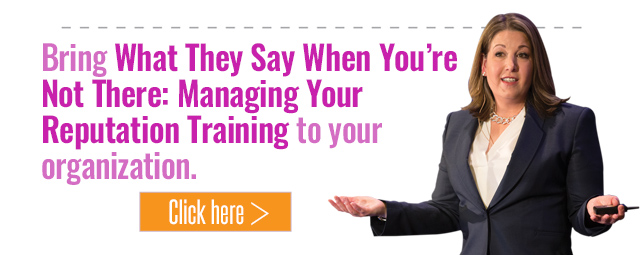Posts Tagged ‘manage up’

At some point, you’ll get passed over for a promotion, project, or piece of work, and no one will tell you why. Why should they? There is little incentive to deal with your likely (human and normal) defensive response. It’s easier to say nothing.
The problem is that this lack of information gives you no ability to manage your career.
Most people get almost no feedback at work. “Good job” isn’t feedback. Neither is, “You seem distracted.” And being told, “You just weren’t the right fit,” is utterly unhelpful.
If you want to manage your career, you need more information. Getting this information might seem scary. You might be thinking, “What if I don’t want to hear what people have to say? What happens if I hear something really bad?” People are so hesitant to give feedback, they’ll be ‘nice’ to you. You won’t hear anything you can’t handle.
There are people in your life who will tell you the impression you create, what you’re like to work with, and why you might not have gotten a job you really want. They’ll tell you, if you ask and make it safe to tell you the truth. Making it safe means you can’t defend yourself. No matter what the person says and how hard it may be to hear, you must respond with, “Thank you for telling me that,” even if you’re convinced they’re wrong.
The easier it is to give you feedback, the more feedback you’ll get. The harder it is to give you feedback, the less you’ll get. Remember, no one wants to deal with your defensive response. It’s easier to say nothing.
Identify five people in your life who care about you, who you trust. They might work with you now, but perhaps not. Don’t overlook your friends, family, spouse and past co-workers. Tell each person, individually, that you want to know more about the impression you make and what you’re like to work/interact with. Do this over the phone or in-person. Emailing the request doesn’t demonstrate seriousness. Ask the person to schedule a conversation with you. Send your questions in advance, so the person is prepared. Have the scheduled meeting; don’t cancel it, even if something important comes up. Consider asking: The first impression you make; what you’re like to work/interact with; the best thing about you; and one change you could make. Say, “thank you,” for the information and not more. Don’t underestimate the power of your emotions. Everyone gets defensive when receiving feedback. Defensiveness can be off putting and scary to others. Don’t do anything to limit future feedback.
Ask these questions a few times a year. You don’t necessarily need to make any changes, based on what you learned. The point isn’t to act on the information, it’s merely to have it. Information is power, and power is control. You can now choose how to act vs. working in the dark.

Posted under
Uncategorized on February 21, 2016 by Shari Harley. Comments
 I’m often asked, “Can I give my boss or the people above me feedback? Is that really realistic?” Giving people ‘above’ you feedback has everything to do with the quality of your relationship and less to do with the person’s title. If your relationship is good and your boss is open to feedback, then yes, you can practice the feedback formula with him/her. If your relationship isn’t that solid or your boss isn’t open to your feedback, practice managing up by asking for what you want instead of giving direct feedback.
I’m often asked, “Can I give my boss or the people above me feedback? Is that really realistic?” Giving people ‘above’ you feedback has everything to do with the quality of your relationship and less to do with the person’s title. If your relationship is good and your boss is open to feedback, then yes, you can practice the feedback formula with him/her. If your relationship isn’t that solid or your boss isn’t open to your feedback, practice managing up by asking for what you want instead of giving direct feedback.
No one likes to be criticized or told that s/he is wrong. When giving someone direct feedback, no matter how kind the delivery, you are telling someone, “You’re doing ______ wrong. Please do _____ instead.” Being that direct is challenging when you don’t have the best relationship or when people are highly defensive. You can achieve the same desired results by simply asking for what you want.
Asking for what you want is less judgmental than giving direct feedback and is a subtle way of telling someone s/he is not giving you what you need. And people who are paying attention will get that. They don’t need it spelled out.
Here are a few ways to practice managing up with your boss and other leaders in your organization:
Example One:
Giving Direct Feedback: “You don’t make time for me. I’m getting behind on projects because you don’t take the time to review my work.”
Managing Up by Asking: “How can we ensure you get to review my work each week, so I can finish the projects I’m working on?”
Example Two:
Giving Direct Feedback: “Every time we have a meeting scheduled, you cancel it.”
Managing Up by Asking: “If meetings get cancelled, is it ok if I reschedule them?
Example Three:
Giving Direct Feedback: “You’re a micromanager. I feel like I can’t make a move without your permission.”
Managing Up by Asking: “I’d like to manage ________ project. What do you need to feel comfortable with me doing that?”
Telling someone at any level s/he is doing something wrong, which will likely evoke defensiveness. And being direct requires both courage and a good relationship. If you don’t have the relationship to be so direct, simply ask for what you want.

Posted under
Uncategorized on June 28, 2015 by Shari Harley. Comments
 You disagree with something someone above you said or did. How do you tell the person without actually telling him?
You disagree with something someone above you said or did. How do you tell the person without actually telling him?
Lots of people think they can’t give direct feedback when talking to someone at a higher level. I’m here to tell you that that’s not true. The ability to speak freely has little to do with titles and more to do with the quality of your relationship. When you’re comfortable with people and have mutual trust, you can say (almost) anything, regardless of titles and levels. But that’s not the true purpose of today’s blog. So I’m going to stick to the topic at hand –what to say when you feel like you can’t say very much.
When you don’t have the relationship to say what you really think, manage up by asking a question instead. Engage the person in a conversation. At some point during the conversation, you’ll be able to say what you think.
For example, you question a decision but don’t want to overtly say you question the decision.
Here’s how the conversation could go:
“I wasn’t involved in the conversations to select our new payroll software. Can you give me a little history? What had us choose our current provider?”
“What software features were important when selecting the software?”
“What problem were we trying to solve that drove the need to make a change?”
“What do you like about the software we picked? What don’t you like?”
** Obviously this is meant to be a discussion, not an interrogation. Ask one question at a time and see where the conversation goes. You may ask all of these questions and you may ask only one.
The point is to gather more information. Manage up by seeking to understand before you express an opinion. As the conversation progresses, you might see opportunities to express your point of view.
Here are three suggestions if you’re going to practice the technique of asking questions as a way to manage up and eventually give feedback:
1. When you ask a question, come from a place of genuine curiosity. If you aren’t truly curious and asking questions is just a technique you found in some blog, it will show.
2. Watch your tone of voice. If you can safely add the words “you dummy” to a question, you have a tone issue.
3. Be patient. Asking questions may feel easier than giving direct feedback, but it also takes more patience and time.
As the conversation progresses, you might be asked for your opinion. Before saying what you think, remember, no one likes to be told that s/he is wrong. And the person you’re talking to likely had a hand in making the decision you’re questioning. Be careful not to judge.
Instead of overtly judging, consider saying something like:
“I think the new system has potential and also has some limitations. Do you want feedback as we use the system and get to know it better?”
“What specifically would you like feedback on? What are you not looking for feedback on?”
“What’s the best way to provide input and to whom?”
You can speak more freely when you have the relationship to do so and have permission. Until you have both, earn the right to give feedback by asking questions from a place of genuine curiosity. And only provide your point of view when you’re asked and are certain you have all the information to defend your position.
Fourteen years ago, during my annual performance review, my manager said, “You had a great year. You rolled out 18 new training programs and got more participation in those programs than we’ve ever seen in the past. But you’re all substance and no sizzle. You’re not good at sharing the work you’re doing, and as a result my boss doesn’t know enough about what you’re doing and to support a large raise for you, so I can’t even suggest one.”

That happened to me ONCE, and I swore it would never happen again.
Too many people believe that if they do good work, the right people will notice and they will be rewarded appropriately. Part of this thinking is accurate. To be rewarded appropriately, you need to be doing good work. But the people in a position to reward you also need to know what you’re doing and the value you’re adding.
You need to find a way to share the value you’re providing without going over your boss’s head, sucking up, or alienating your coworkers.
Here are four ways to manage up while strengthening your business relationships:
Manage up tip number one: Ask your manager’s permission to send him a weekly update of what you accomplished during the week. This should be a one-page, easy-to-read, bulleted list of accomplishments or areas of focus.
Your boss is busy and most likely doesn’t follow you around all day. As a result, you need to let him know about the work you’re doing. Don’t make him guess.
Manage up tip number two: Periodically share what you’re doing with the people your manager works for and with. That can sound like, “I just wanted to share what my department is accomplishing. We’re really excited about it.” Ask your manager’s permission to do this and tell her why you want to do it (to ensure that the senior people in your organization are in-the-know about what your department’s accomplishments).
If you’re not sure who can impact your career and thus who you should inform about your work, ask your manager. She knows and will tell you, if you ask.
Manage up tip number three: Use the word “we” versus “I.” “We accomplished…..” “We’re really excited about….” Using the word “we” is more inclusive and makes you sound like a team player versus a lone ranger.
Manage up tip number four: If you work remotely and don’t see your coworkers and manager often, make sure you’re keeping people informed about what you’re doing. Likewise, if you work flexible hours – leave early, come in late, and work at night – people will assume you’re working fewer hours than them and will talk about it to whoever will listen. So while the hours you work shouldn’t be anyone’s business, people in organizations talk about stuff like this.
Don’t assume that people know what you’re doing or the value you’re adding to your organization. Instead, assume people have no idea and find appropriate ways to tell them. You are 100% accountable for your career.

Most employees are afraid of getting fired. As a result, employees are often afraid of the most senior people in organizations, simply because of their titles. The better the title, the scarier people are. And if employees are scared of organizational leaders, they’re not going to be  inclined to give those leaders negative feedback. The most senior people in an organization get the least information of anyone.
inclined to give those leaders negative feedback. The most senior people in an organization get the least information of anyone.
No one likes to be told that he is wrong. Negative feedback tells the person he did something wrong. But there is more than one way to give feedback. Asking questions can be equally as effective as giving direct feedback.
If you want to give a senior person negative feedback, but you’re afraid of the consequences, manage up by asking more and saying less..
Here are some ways to manage up by asking questions:
Rather than saying, “I disagree, I think you’re wrong, or this is a mistake,” consider managing up by asking questions like:
- We’ve chosen to invest a lot in this software. I wasn’t here when the software was chosen. What’s the history of this initiative?
- What were the criteria for selection?
- How do you think it’s going?
- What are you concerned about?
- What are you satisfied with?
- What else have we tried?
- What are your thoughts about…?
- What if we tried…?
Asking questions gets the person involved in a discussion, during which you can eventually express your point of view. When you ask questions, you say very little, and definitely don’t call the person’s decision-making into question.
Human beings are wired for survival. Receiving negative feedback kicks the need to defend oneself into gear, hence why people become defensive when they receive negative feedback. Negative feedback calls survival into question. If you don’t want people to become defensive, don’t require them to defend themselves. A discussion, during which you ask questions, is much less threatening than overtly disagreeing with someone’s point of view.
Asking questions takes more time and more patience than giving direct feedback. But it also takes less courage, and the quality of your relationship doesn’t have to be as good. You need a pretty good relationship to give direct feedback. If you don’t have that relationship, manage up by asking questions instead of being so direct.
If you do choose to ask questions, watch your tone. If you can safely add the words “you dummy” to a question, you aren’t really asking a question, you’re giving feedback, which is likely to evoke the defensive response you’re seeking to avoid.
It’s important to be able to express your point-of-view at work. Staying in a job or organization in which you can’t speak up, doesn’t feel great and doesn’t leverage the best of what you have to offer. But if you’re concerned about giving direct feedback, manage up by asking questions. Say less. Ask more.

No matter how much you like and get along with your boss, your boss is not your friend. Nor is your boss your confidant or venting buddy.
Unless your boss follows you around all day, every day, she is not aware of all the things you do at work. And if she does follow you around, she probably needs more to do, which I doubt.
Given that your boss often doesn’t see you work, the only exposure you may have to each other is during one-on-one and group meetings. So be careful how you behave during these meetings.
I’ve made lots of career mistakes . . . once. Here’s a mistake I made before launching Candid Culture. I’m hoping you won’t replicate it.
In my last job, I was lucky enough to have a great boss. He was a good coach and mentor. He supported me, gave me exposure throughout the company, and always had my back. We didn’t cross paths much at work, except during our regularly scheduled one-on-one meetings.
I’m what some might call passionate. I have a strong sense of what is right and what is wrong. And I can be critical of those who I think don’t do the right things.
I would often share my frustrations with my boss. The head of that department didn’t do this. This person made a bad call. So and so was making my employees’ lives hard. I wasn’t complaining, well I kind of was, but not without a purpose.
One day my boss called me out on my passionate (and at times critical) style. He said that if I was so impassioned during meetings with him, he assumed I was equally vocal in meetings with other people and departments.
This wasn’t the case. I was very careful in how I managed myself with other people in our company. I understood the importance of good business relationships and knew that people work with the people they want to work with and around the people they don’t.
But my boss didn’t get to see any of those interactions. For the most part all he saw was how I interacted with him during our meetings. With no other point of reference he was left to assume that if I vented with him, I did this with other people. If I got a little too soapboxish about an issue with him, I must do the same in other meetings. I didn’t do those things with other people, but he had no way to know that.
My boss and I had a good relationship and I felt comfortable with him, probably too comfortable. I was politically savvy with everyone but him.
Your boss is an appropriate person with whom to express frustration, but manage how you do it. Don’t vent to vent. Every topic you raise should be with the aim of problem solving. Keep things honest but positive. Vent and complain at home, or with someone who doesn’t know the people you work with. Or better yet, spare your friends and family, and take your frustration to the gym, or the shoe department, whatever your preferred form of therapy.
Assuming you have limited exposure to your boss, make the time you have with her count. Put in front of your boss only what you want her to see. I’m not saying to be disingenuous or brush problems under the rug. Speak candidly, but manage yourself with your boss as you would with any internal or external customer.
If you stayed out until two in the morning and you’re dragging the next day, your boss doesn’t need to know that. She will assume you’re not on your game that day and that will be a check mark in the negative category for lacking good judgment and commitment to your job and the company. If you had a bad date, your boss doesn’t need or even want to know. If you think someone you work with is a dolt, ask for help in how to work well with him, and keep your opinion of his acumen to yourself.
Your boss has limited time and exposure to you. Manage yourself by showing him your polished and professional self.




 I’m often asked, “Can I give my boss or the people above me feedback? Is that really realistic?” Giving people ‘above’ you feedback has everything to do with the quality of your relationship and less to do with the person’s title. If your relationship is good and your boss is open to feedback, then yes, you can practice
I’m often asked, “Can I give my boss or the people above me feedback? Is that really realistic?” Giving people ‘above’ you feedback has everything to do with the quality of your relationship and less to do with the person’s title. If your relationship is good and your boss is open to feedback, then yes, you can practice 
 You disagree with something someone above you said or did. How do you tell the person without actually telling him?
You disagree with something someone above you said or did. How do you tell the person without actually telling him?

 inclined to give those leaders negative feedback. The most senior people in an organization get the least information of anyone.
inclined to give those leaders negative feedback. The most senior people in an organization get the least information of anyone.
